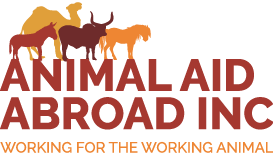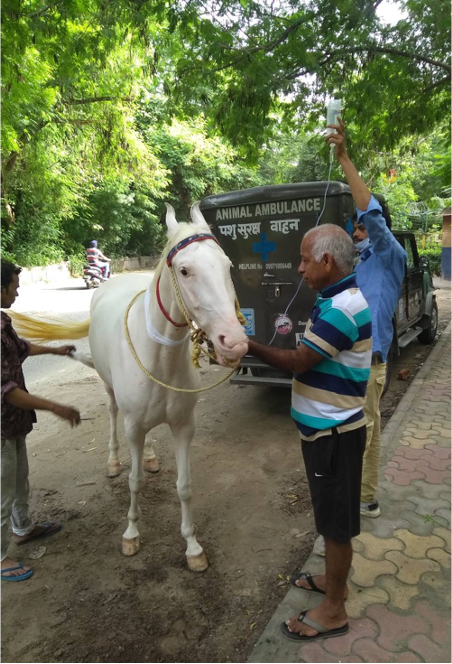Providing a Lifeline for Working Equines in India
In New Delhi, AAA partner group, Friendicoes, are always busy providing vital, free veterinary care for working equines who would otherwise suffer and remain untreated. Some of the cases seen throughout August included: colic, lacerated chest and shoulder wounds, maggot-infested wound on a foal, hip wound, skin infection and a neck injury caused by fencing wire. Read more about these cases below:
Colic: A working horse was unable to defecate and was found to be suffering from dehydration and impaction, leading to colic. Fluid therapy was commenced and painkillers administered. The horse was given a rectal enema and the owner advised to provide him with plenty of water in future.
Lacerated Chest Wound: The team treated a horse who had fallen over an iron pole at night. This led to a deep, lacerated wound on her chest. Friendicoes cleaned and sutured the wound antiseptically, then provided the horse with antibiotics, pain medication and a tetanus vaccine.
Lacerated Shoulder Wound: In the case of another lacerated wound, a horse was involved in a road accident with a tractor. The lacerated shoulder wound was cleaned with antiseptics and dressed. Additionally, antibiotics, painkillers and a tetanus vaccine were given.
Maggot Wound Umbilical Area: Friendicoes treated a foal with a maggot wound in her umbilical region. Ivermectin was applied to kill the maggots, then negasunt powder (antibacterial) was used and the wound dressed properly. Pain medication was also administered.
Hip Wound: A donkey was injured in a train accident. He is required to work carting materials on this site and was hit by a train whilst grazing. The resultant wound on his hip became infected, which the Friendicoes’ team cleaned with antiseptics before dressing it. The donkey was administered antibiotics, painkillers and a tetanus vaccine.
Fencing Wire Neck Injury: A working mule from a brick kiln was injured by sharp fencing wire whilst out grazing. She sustained an injury on her neck. The veterinary team cleaned and dressed the wound appropriately, then administered pain medications and a tetanus vaccine.
Skin Infection: The team treated a horse suffering from a mixed bacterial and fungal skin infection. They used chlorhexidine wash to disinfect the region, along with anti-fungal spray. Antibiotics and antiallergic medication were also given. Hopefully this treatment will reduce this poor horse’s pain and irritation.
Rescue of Pony: Friendicoes came to the rescue of a pony who had fallen into a canal whilst grazing. She had slipped and could not get out, as the sides were smooth and offered no traction. Along with local support, the pony was rescued from the canal and began happily grazing again.
Donkey Rescue: The team rescued a Donkey in Gurgaon. He had a maggot-infested, lacerated wound on his belly, possibly due to a dog bite. The wound was cleaned with antiseptics and local ivermectin was applied. A tetanus vaccine and pain medication was administered. This lucky donkey was brought back to Friendicoes’ Gurgaon sanctuary for treatment and care. He will now live there permanently.
In addition to running their busy mobile veterinary clinic, Friendicoes have also been maintaining a feeding program for working animals during the pandemic. Throughout August, they fed working animals in at the Okhla and Turkman Gate stands. Over 160 equines and over 300 cattle were fed through this program.
Paravet Program
AAA funds 5 field paravets – Zaheer, Sakir, Salman, Nabab and Om - who work for Friendicoes and cover a wide range of locations throughout New Delhi. Every month, each paravet provides basic veterinary care for 150 to 200 working animals. AAA funds the paravets’ motorcycles, first aid kids and emergency medicine to allow them to travel widely and assist as many working animals in need as possible.
Paravets are trained to provide first aid treatment, such as wound dressing, and inform the vets at Friendicoes of any emergency cases. Their role also involves implementing follow up treatments, such as injections, ointments, tonics or post-operative care. Additionally, they assist with deworming and vaccination of animals.
Along with providing this medical care, Friendicoes’ paravets provide education for owners on animal welfare in their local language, ensure that owners are using medications correctly and prevent cruel home remedies from being used (they have now almost ended the practice of firing in their areas). The paravets alert the rest of the team to any suspected cases of animal abuse and cruelty.
Thank you to both the Friendicoes’ vets and paravets for your immense efforts assisting the working equines of New Delhi!
And thank you to our donors who allow us to support their crucial work.


















